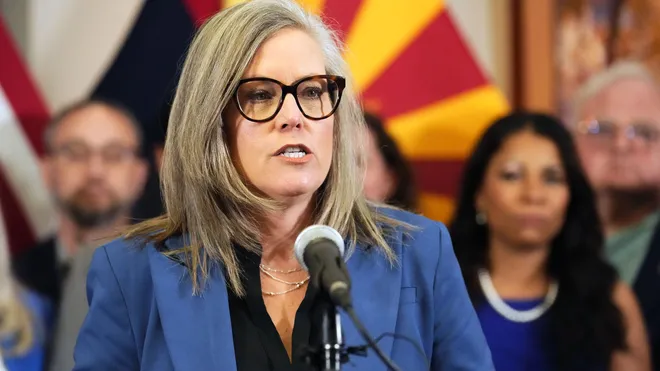Arizona’s Attorney General Kris Mayes’ office is launching a criminal investigation into political donations from a state contractor with ties to Arizona Governor Katie Hobbs, a Democrat who narrowly defeated GOP challenger Kari Lake in 2022.
According to a report from Arizona Central, a home operator partnering with the Arizona Department of Child Safety has received a substantial increase in state funding, while pay raises for other providers have been denied. Over the past year, the Arizona Department of Child Safety has approved a 60 percent increase in Sunshine Residential Homes Inc.’s daily rate for child care.
The outlet reported this amounts to “potentially millions of dollars more going to the company at taxpayers’ expense.” The CEO of the company, Simon Kottoor, was part of Hobbs’ inaugural committee, and Hobbs praised the company while campaigning for governor. As Arizona DCS renegotiated its contracts with home providers, Hobbs and her husband attended a private event at the mansion of the CEO of the company.
On Thursday, AG Mayes’ office announced that it will open a criminal probe into Sunshine Residential Homes Inc. The investigation comes at the behest of Republican State Senator T.J. Shope, who asked Mayes to investigate a potential “pay-for-play” scheme.
“The Criminal Division of the Attorney General’s Office is statutorily authorized to investigate the allegations and offenses outlined in your letter,” Mayes’ office wrote in a letter to Shope. “To that end, the Attorney General’s Office will be opening an investigation.”
In a letter signed by Mayes’ criminal division chief, Nick Klingerman, he thanked Shope for the referral. However, he did not mention Governor Hobbs or the Arizona Department of Child Safety directly. Details of the investigation’s goals or targets remain sparse as of now.
“I hope that they will do a fine job and actually go through fairly, through the entire process, and completely thoroughly as well,” Shope said in response to the news. Shope and other Republicans have also asked Shope had also asked Maricopa County Attorney Rachel Mitchell, a Republican, to open her own investigation.
This isn’t the only legal hot water Hobbs is in. An Arizona judge ruled Wednesday that she illegally appointed “de facto” agency directors while sidestepping opposition to her nominees by state Senate Republicans, KTAR reported. Hobbs did not have the authority to appoint “deputy directors” to lead 13 state agencies after the Senate Committee on Director Nominations rejected multiple picks following contentious hearings, according to the ruling.
Senate President Warren Petersen formed the vetting committee approximately one month after Arizona’s first Democratic governor since 2009 assumed office in early 2023. Consequently, nominees selected by Hobbs couldn’t proceed to a confirmation vote in the full Senate without the committee’s approval. Under state law, the governor’s nominees can’t serve as director for more than a year without Senate confirmation, the outlet reported.
See also: Kari Lake Gets Incredible News As She Seeks To Win Back An Arizona Senate Seat For the GOP
On Wednesday, Maricopa County Superior Court Judge Scott Blaney ruled in favor of the Senate after the chamber filed suit, saying Hobbs “has improperly, unilaterally appointed ‘de facto’ directors for these 13 agencies, despite the actual job title she has assigned to them.” Blaney also wrote that Hobbs’ “frustration with a co-equal branch of government – even if that frustration was justified – did not exempt her director nominees from Senate oversite.”
Blaney did not grant relief to the Senate in Wednesday’s ruling. Instead, the judge gave the parties the opportunity to settle their dispute, stating that the court will schedule an evidentiary hearing or oral argument for late July or early August.
“This will give these co-equal branches of government an opportunity to meet and confer in an attempt to reach a mutually agreeable resolution,” the ruling says. “If they are unsuccessful, the Court will hold a brief hearing to consider the evidence and arguments regarding mandamus and injunctive relief.”



